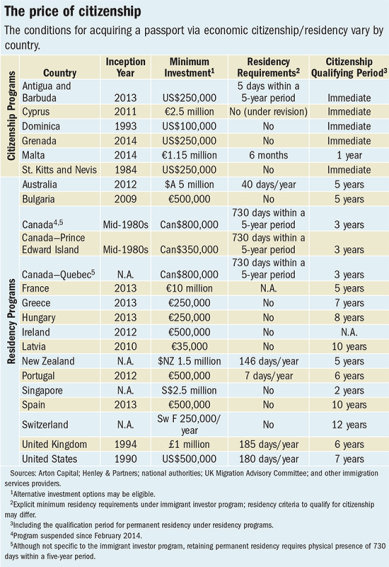There has been a proliferation of so-called citizenship-by-investment or economic citizenship programs that allow individuals from all over the world to legitimately acquire passports and more and more countries have joined the game. [Below are the terms and conditions, by country, for acquiring such a passport.]
programs that allow individuals from all over the world to legitimately acquire passports and more and more countries have joined the game. [Below are the terms and conditions, by country, for acquiring such a passport.]
The comments above and below are excerpts from an article from blog-imfdirect.imf.org which has been edited ([ ]) and abridged (…) to provide a faster and easier read.
The wealthy, especially in emerging market economies, see buying citizenship or residency rights as a means of greater global mobility (visa free travel in many countries), tax planning, and family security. In exchange, countries administering such programs receive significant financial inflows into their economies.
Indeed, offering citizenship in return for investment has been a “win-win” for some small Caribbean states. The substantial inflows of funds from these programs have helped boost employment and growth. Inflows to the public sector alone in St. Kitts and Nevis had grown to nearly 25 percent of GDP as of 2013.
Now more and more countries have joined the game. While all well and good, these countries face the critical challenge of preserving the credibility of their citizenship programs and weeding out the risks to governance and sustainability. In addition, small countries may also confront sizeable macro-challenges in managing large inflows.
Read more in this article published in Finance & Development.
 munKNEE.com Your Key to Making Money
munKNEE.com Your Key to Making Money
